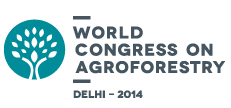Agroforestry option for improving livelihood and environment: case study from eastern Indonesia
Agroforestry option for improving livelihood and environment: case study from eastern Indonesia
wca2014-1929 Suyanto Suyanto 1,*Noviana Khususiyah 1,Subekti Rahayu 1,James Roshetko 1 1World Agroforestry Centre (ICRAF), Bogor, IndonesiaGlobal climate change, expected to result in global warming, is the most serious environmental problem the world faces. The greatest impacts of climate change will be felt first, and most seriously, by the poorest countries of the world. Over the long term, climate change is likely to have a very serious impact on ecosystems and the world’s poorest people, who are the most vulnerable as they depend heavily on natural resources for their food and livelihoods. To anticipate these problems, it is important to promote land management that can improve livelihoods and the environment simultaneously. A recent study carried out in Sulawesi, Indonesia, found that farmers who practised agroforestry received higher benefits than farmers who did not. Agroforestry farmers obtained income as much as USD 2701 per year, which is twice higher than non-agroforestty farmers at USD 1300 per year. The land productivity of agroforestry was USD 907 per ha per year or 50 percent higher than non land agroforestry. The practice of agroforestry is a livelihoods strategy for farmers with only small pieces of land (average landholding per household of around 1.4 ha) who plant mixed species of trees such as cacao, coffee, clove and fruit. Agroforestry is also a strategy to minimize risk from unstable commodities prices, pests and diseases and also from the negative impact of climate. Agroforestry can also provide environmental services; we assessed the carbon stock for each land-use system to value the environmental services. The time average of carbon stock of agroforestry systems at this site was 28–64 ton. It is higher than the time average carbon stock of rice and maize, which is 0.7–0.9 ton.

